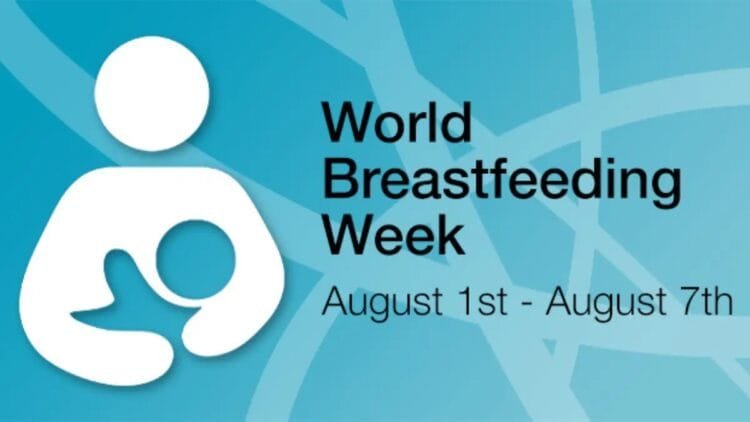Introduction to World Breastfeeding Week
World Breastfeeding Week is an annual global celebration observed from 1 to 7 August. It is backed by notable organizations such as the World Health Organization (WHO), UNICEF, and several health ministries worldwide. This significant event was established to advocate for and promote breastfeeding, underscoring its critical role in enhancing maternal and child health. The inception of World Breastfeeding Week can be traced back to 1992, orchestrated by the World Alliance for Breastfeeding Action (WABA) to shed light on the profound benefits of breastfeeding for infants and mothers alike.
The focus of World Breastfeeding Week has evolved over the years. Initially, it sought to raise awareness about the superiority of breastfeeding over other feeding methods. Over time, its scope has expanded to address the multifaceted challenges and systemic barriers that mothers face, ranging from inadequate maternity leave policies to lack of support within healthcare settings and communities. This evolution reflects the dynamic nature of global health priorities and the continuous efforts to close the gap for breastfeeding support.
Collaboration is a cornerstone of World Breastfeeding Week. Each year, an array of activities and campaigns are conducted around the globe, bringing together government bodies, healthcare providers, and advocacy groups. These collaborative efforts aim to create a supportive environment for breastfeeding through policy advocacy, education, and community engagement. Public awareness campaigns, workshops, and informational sessions are held to empower parents with the knowledge and tools necessary for successful breastfeeding.
The importance of World Breastfeeding Week is underscored by evidence-based research highlighting the numerous benefits of breastfeeding. It provides optimal nutrition, bolsters the immune system, and fosters a unique bond between mother and child. Furthermore, it has long-term health advantages, such as reducing the risk of certain chronic conditions for both mothers and their children. By celebrating World Breastfeeding Week, the global community reaffirms its commitment to supporting breastfeeding mothers and ensuring healthier futures for the next generation.
Theme for 2024: Closing the Gap: Breastfeeding Support for All
The theme for World Breastfeeding Week 2024, “Closing the Gap: Breastfeeding Support for All,” underscores the imperative of equitable support for breastfeeding mothers irrespective of their community, socioeconomic status, or background. This theme is particularly salient as it addresses the existing disparities in breastfeeding support that often disadvantage marginalized groups. By promoting inclusivity and equality, the campaign seeks to ensure that every mother and infant has the opportunity to benefit from breastfeeding, known for its manifold health benefits.
The significance of this theme lies in its comprehensive approach to tackling the various barriers that hinder breastfeeding. Issues such as lack of access to lactation consultants, inadequate maternal leave policies, and cultural stigmas are prevalent in certain communities and need concerted efforts to be overcome. The campaign highlights the need for inclusive policies and practices that are sensitive to the unique challenges faced by different groups, thereby fostering an environment where breastfeeding is universally supported and encouraged.
The objectives of this year’s campaign are multi-faceted. Firstly, it aims to raise awareness about the importance of breastfeeding and the disparities in support that currently exist. This involves educating healthcare providers, employers, and the public about the critical role they play in facilitating breastfeeding. Secondly, the campaign advocates for policy changes at both the institutional and governmental levels to provide a robust support system for breastfeeding mothers. This can include implementing paid maternity leave, establishing lactation rooms in workplaces, and providing access to professional breastfeeding support services.
Various stakeholders—including healthcare professionals, government agencies, employers, and community organizations—are called upon to contribute to these objectives. Healthcare professionals can receive training to provide culturally competent care, employers can create breastfeeding-friendly work environments, and policymakers can enact legislation to protect and support breastfeeding mothers. By working collaboratively, these stakeholders can help bridge the gap in breastfeeding support, ensuring that all mothers have the resources they need to nourish their infants successfully.
Celebrating Diversity in Breastfeeding Journeys
Breastfeeding journeys differ vastly among mothers around the world, each path shaped by a constellation of cultural, social, and personal factors. In celebrating these diverse experiences, we can gain a more comprehensive understanding of the many ways breastfeeding support should be customized to meet varied needs.
Consider the story of Aisha from Nigeria, who faced societal expectations that called for introducing solids early, yet she was determined to exclusively breastfeed for the first six months. Her journey was marked by both resistance and support from her community, embodying the intricate balance many mothers navigate. Aisha’s perseverance highlights the vital role of community education in nurturing positive breastfeeding practices.
Meanwhile, Mariko from Japan encountered differing challenges. Japan’s high-paced work culture often leaves little room for extended maternity leave. Mariko’s triumph lay in the support she received from her employer, who provided a dedicated breastfeeding room at work. This accommodation allowed her to continue breastfeeding while maintaining her professional duties, underlining the significance of workplace policies in sustaining breastfeeding efforts.
Natasha from Canada, a mother of twins, offers another unique narrative. Faced with the physical demands of tandem nursing and concerns over producing enough milk, she found solace and guidance in local breastfeeding support groups. Her experience underscores the crucial role of peer support networks in fostering successful breastfeeding outcomes.
The breastfeeding journey of Tesfaye from Ethiopia provides yet another perspective. Familial practices, such as the involvement of extended family in child-rearing, profoundly influenced her breastfeeding routine. The traditional practices, deeply rooted in their culture, offered her a robust support system, demonstrating the importance of respecting and integrating cultural norms in breastfeeding support strategies.
These global stories illuminate the rich tapestry of breastfeeding experiences. By valuing and understanding the unique challenges and triumphs of mothers across different cultures, societies, and personal circumstances, we can foster an inclusive and effective approach to breastfeeding support. Such inclusivity ensures that every mother’s journey is respected and supported, ultimately enhancing the breastfeeding experience for families worldwide.
Roles of Families, Communities, and Societies in Supporting Breastfeeding

Breastfeeding is a natural and crucial practice for the health and well-being of both mother and child. However, the success of breastfeeding significantly hinges on the support provided by families, communities, and societies. This support can take various forms, including emotional, physical, and logistical assistance, each of which plays a critical role in fostering a conducive environment for breastfeeding mothers.
Within the family, fathers, grandparents, and siblings can provide essential emotional support by expressing encouragement and understanding the mother’s breastfeeding journey. Practical help, such as taking care of household chores or watching older children, can relieve some of the mother’s stress, enabling her to focus on breastfeeding. For instance, in Scandinavian countries, it is common for fathers to take paternity leave, allowing them to participate actively in the early stages of childcare and breastfeeding support.
Communities also have a pivotal role in nurturing breastfeeding practices. Community groups, whether formal or informal, can offer platforms for mothers to share experiences and receive peer support. Local health clinics, breastfeeding support groups, and outreach programs can educate mothers on best practices, troubleshoot common issues, and provide a sense of solidarity. A notable example is the La Leche League, which operates globally to provide mother-to-mother support, fostering communities committed to promoting and protecting breastfeeding.
Societies at large can contribute through policies and cultural practices that normalize and encourage breastfeeding. Implementation of workplace policies such as paid maternity leave, breastfeeding breaks, and designated comfortable nursing areas can have a profound impact. Countries like New Zealand and Canada have exemplary maternity policies that reflect societal support for breastfeeding. Additionally, public awareness campaigns, like those seen during World Breastfeeding Week, can play a significant role in normalizing breastfeeding, reducing stigma, and advocating for the rights of breastfeeding mothers.
Across different cultures and regions, these supportive roles manifest in unique ways but share a common objective: to create an enabling environment where breastfeeding mothers feel supported, respected, and empowered. Together, families, communities, and societies can bridge the gap, ensuring that breastfeeding support is readily accessible to all who need it.
Health Workers and Their Impact on Breastfeeding Success
Health workers play a crucial role in fostering breastfeeding success. By providing the necessary support and guidance, they can significantly influence the initiation and continuation of breastfeeding, which is vital for both maternal and child health. Proper training and resources for health professionals are essential components in this process, ensuring they are well-equipped to assist breastfeeding mothers.
Training for health workers should encompass comprehensive modules on breastfeeding techniques, common challenges, and the physiological benefits of breastfeeding for both mother and child. Programs certified by organizations such as the World Health Organization (WHO) and UNICEF often serve as gold standards. These programs emphasize the importance of breastfeeding within the first hour of birth and exclusive breastfeeding for the first six months of a child’s life.
Ongoing support for health professionals is equally critical. Continuous education through workshops, seminars, and online courses helps keep health workers updated on the latest research, tools, and practices in lactation support. Moreover, having access to a network of lactation consultants and specialists provides an additional layer of expertise, ensuring that complex cases or persistent challenges can be addressed promptly and effectively.
Successful programs around the world have demonstrated the positive impact of well-trained health workers. For example, the Baby-Friendly Hospital Initiative (BFHI), implemented in numerous countries, illustrates the significant improvements in breastfeeding rates when healthcare facilities adhere to ten specific steps. These steps include creating breastfeeding-friendly policies, training staff adequately, and providing mothers with the support they need from the moment of birth.
In Norway, for instance, the implementation of nationwide breastfeeding counseling and support programs has resulted in some of the highest breastfeeding rates globally. Similarly, in Brazil, the Combined Health And Social Protection Program (CHASP) has been instrumental in training thousands of health workers, directly contributing to increased breastfeeding initiation and persistence rates.
Ultimately, the empowerment of health workers through robust training and consistent support forms the backbone of successful breastfeeding initiatives. Their role is indispensable, not only in educating and supporting mothers but also in fostering a healthcare environment where breastfeeding is seen as the norm, leading to healthier outcomes for both infants and mothers worldwide.
Government Policies and Workplace Support for Breastfeeding
Government policies and workplace conditions play a crucial role in influencing breastfeeding practices among new mothers. Legislative measures, such as maternity leave provisions, mandated breastfeeding breaks, and the provision of lactation rooms in workplaces, are essential for supporting breastfeeding mothers in their return to work. These policies not only contribute to the health and well-being of infants and mothers but also to the productivity and satisfaction of the workforce as a whole.
Globally, the provision of maternity leave varies significantly. For instance, countries like Sweden and Estonia offer generous paid maternity leave, which extends up to over a year, allowing mothers ample time to establish and maintain breastfeeding. In contrast, the United States offers 12 weeks of unpaid leave under the Family and Medical Leave Act (FMLA), which often proves insufficient for new mothers to manage exclusive breastfeeding. To bridge this gap, some states and employers in the U.S. have implemented their own supportive measures, but a comprehensive national policy is still lacking.
Furthermore, supportive breastfeeding policies go beyond maternity leave. Many progressive nations have enacted laws that require employers to provide breastfeeding breaks and designated lactation rooms. In countries like Brazil and Italy, employers must both provide the necessary breaks and a suitable space for breastfeeding or pumping milk. In Japan, the Labour Standards Act mandates employers to grant an hour’s break to nursing mothers. These measures cater to the physiological needs of breastfeeding mothers, thus encouraging continued breastfeeding after returning to work.
Examples of countries at the forefront of breastfeeding support include Norway and New Zealand. Norway offers both parents a combined 91 weeks of paid leave, with specific allocations for the father, ensuring shared childcare responsibilities and sustained breastfeeding. New Zealand’s Employment Relations Act mandates that employers accommodate breastfeeding employees with suitable facilities, reflecting a strong commitment to maternal and infant health.
Overall, the enhancement of government policies and workplace conditions is imperative for the promotion of breastfeeding. By fostering an environment where breastfeeding is supported both legislatively and practically, nations can make significant strides towards improving public health and securing the well-being of future generations.
Sharing Knowledge: Benefits and Strategies of Breastfeeding
Education and awareness are essential to promoting breastfeeding as a fundamental health practice. Scientifically, breastfeeding has been linked to numerous benefits for both mothers and infants. For infants, breast milk provides a comprehensive source of nutrients, boosting their immune system and promoting healthy growth and development. Research indicates that breastfed babies have a reduced risk of respiratory infections, gastrointestinal disorders, and sudden infant death syndrome (SIDS). Moreover, breastfeeding supports cognitive development due to the presence of essential fatty acids and other critical nutrients.
For mothers, breastfeeding can serve as a natural form of birth control during the initial six months postpartum, a phenomenon known as lactational amenorrhea. Additionally, it aids in postpartum recovery by helping the uterus contract more efficiently. Long-term benefits include a reduced risk of developing breast and ovarian cancers, type 2 diabetes, and cardiovascular diseases. These health advantages highlight the importance of disseminating breastfeeding knowledge widely.
Strategic approaches and practical tips for successful breastfeeding can significantly support new mothers and their families. Initiating breastfeeding within the first hour after birth, often referred to as the “golden hour,” can set a strong foundation. Positioning and latch techniques are critical, and professional lactation consultants can offer invaluable guidance in these areas. Skin-to-skin contact not only enhances infant bonding but also regulates the baby’s temperature and feeding cues, fostering a more successful breastfeeding experience.
Moreover, creating a conducive environment is vital. Ensuring there is a quiet, comfortable space for breastfeeding can reduce stress for both the mother and the infant. Encouraging frequent feeding, at least 8-12 times in a 24-hour period, helps maintain milk supply and aligns with the infant’s needs. Communities and healthcare providers should also offer substantial support, creating a robust support network that includes educational resources and accessible healthcare services.
By focusing on the benefits and strategies of breastfeeding, we can foster a supportive environment where breastfeeding is normalized and encouraged, bridging the gap in breastfeeding support worldwide.
Global Impact and Future Directions of World Breastfeeding Week
World Breastfeeding Week (WBW) has significantly influenced both global awareness and policies regarding breastfeeding since its inception in 1992. This annual event, held during the first week of August, underscores the crucial role breastfeeding plays in nurturing healthy infants and sustaining maternal health. Over the years, WBW has been instrumental in bringing together governments, communities, and organizations to collaboratively advocate for improved breastfeeding support, protection, and promotion.
Analyzing data from previous WBW events reveals a number of substantial achievements. Increased national policies supporting breastfeeding, enhanced maternity leave provisions, and greater public awareness have all stemmed from these initiatives. For instance, reports from UNICEF and the World Health Organization (WHO) indicate a steady rise in global breastfeeding rates, directly correlating to campaigns and educational efforts propelled by WBW.
However, significant challenges persist. Social stigma, limited access to professional lactation counseling, and inadequate parental leave policies in certain regions continue to impede breastfeeding practice. Disparities in breastfeeding support between high-income and low-income countries further exacerbate these challenges, highlighting the urgent need for a more equitable approach.
Looking ahead, the vision for WBW includes not just sustaining its momentum but expanding its scope and reach. Future directions emphasize the importance of addressing socio-economic, cultural, and structural barriers to breastfeeding. Leveraging digital platforms for education and support, fostering stronger public-private partnerships, and enhancing data-driven policies are pivotal components of this forward-thinking approach.
In light of these reflections and projections, the global community stands at a critical juncture. Ensuring continued and enhanced support for breastfeeding initiatives necessitates collective effort and commitment. Stakeholders at all levels—from policymakers to healthcare providers to community leaders—must collaborate to bridge existing gaps and build a more enabling environment for breastfeeding worldwide. This aligned endeavor will be essential in realizing the full benefits of breastfeeding for both mothers and their children, contributing to healthier societies on a global scale.















